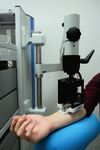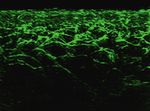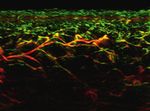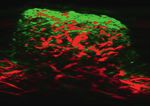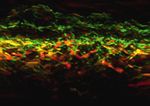EXPLORER C50 - iThera Medical
←
→
Page content transcription
If your browser does not render page correctly, please read the page content below
RSOM EXPLORER C50
RASTER-
SCANNING
OPTOACOUSTIC
M E S O S CO P Y
RSOM Explorer C50
RSOM Explorer ms-C50
• Optoacoustic mesoscopy for clinical research
• Up to 10 μm resolution at 1-2 millimeters depth
• Visualization of microvasculature
The device is for investigational use only.
Listening to MoleculesTECHNOLOGY
IMAGE GENERATION
• Illumination of tissue with nanosecond laser pulses
• Ultra-wide bandwidth acoustic signal detection
• Live preview of full cross-section
RECONSTRUCTION
• Fast multi-frequency-band image reconstruction
• Low-frequency band (11-33 MHz) for larger vessels
• High-frequency band (33-99 MHz) for capillaries
VISUALIZATION
• MIP (maximum intensity projection) and 3D visualization
• Imaging depth up to 2 mm with 10 µm axial resolution
• Data and image export to 3rd party software
MULTISPECTRAL
• Laser with 4 wavelengths (532, 555, 579, 606 nm)
• Spectral unmixing for oxy- and deoxy-hemoglobin, melanin
• Map and quantify oxygen saturation
OPTIONS AND Options: Accessories:
• Multispectral illumination • Coupling membranes
ACCESSORIES • Advanced user training • L aser safety goggles
IMAGING WORKFLOW
LASER EXCITATION
+ MULTISPECTRAL IMAGING
ULTRASOUND DETECTION
Laser wavelengths
532 nm
absorption coefficient (cm-1)
Melanin
300 HbO 2
Hb 555 nm
raster scan 579 nm
200
606 nm
human skin
100
0
450 500 550 600 650
wavelength (nm)
FREQUENCY BAND RECONSTRUCTION
Hb
Hb
HbO 2
Melanin
11-33 MHz 33-99 MHz 100%
rSO 2 map
HbO 2
HbO2 saturation
Merge 3D Melanin 500 µm
0%APPLICATIONS
RSOM has been applied in a variety of clinical applications, including the examples below:
Psoriasis plaque Healthy skin
INFLAMMATORY SKIN DISEASE
hair
Assess disease biomarkers in psoriasis1 EP EP
By comparing psoriatic and healthy human skin, researchers
identified epidermal thickening and increased dermal blood
volume. Using label-free biomarkers, investigators established DR DR
non-invasive quantitative metrics that correlated well with
500 µm
gold standard assessments such as the PASI index.
EP = epidermis / DR = dermis
Diabetes Healthy skin
MICROCIRCULATION
EP EP
Use skin as a surrogate for systemic disease2
Diabetes mellitus affects the microvasculature of several DR DR
organs. However, the skin is the most accessible organ and
therefore could offer a window into this systemic disease.
Dermal microvascular density, total dermal blood volume and 500 µm
epidermal parameters were used to study disease severity.
Baseline Occlusion Release
OXYGENATION
Monitor oxygen delivery in microvasculature3 EP
Using currently available clinical imaging tools, it is difficult
to non-invasively observe hemodynamic regulation in the
DR
peripheral vessels. Vascular occlusion demonstrated the
ability to monitor oxygen saturation changes in systemic vas- 500 µm
cular disease and potentially during therapeutic interventions. Hb HbO 2 Eumelanin
Pigmented nevus Melanoma lesion
SKIN CANCER
Visualize angiogenesis in high resolution 4 EP EP
Tumor growth and metastasis depend on angiogenesis.
Visualizing vascular characteristics in 3D over time can allow DR
DR
the study of microcirculation in tumors and downstream
effects such as hypoxia and acidosis. These patterns could
potentially improve diagnostics and assessment of thera- 500 µm
peutic efficacy. Hemoglobin Melanin
Healthy skin Allergic reaction
SKIN AGING
Quantify new microvascular biomarkers 5 EP
EP
Aging of the skin, driven in part by age-dependent changes
in the immune system, involves atrophy of the dermis and DR
DR
epidermis. Changes in skin structure and vascularity have
been visualized by RSOM in allergic patch testing and fol- 200 µm
lowing ultraviolet light exposure.
1) A guirre J et al., Precision assessment of label-free psoriasis biomarkers with ultra-broadband optoacoustic mesoscopy,
Nature Biomedical Engineering volume 1, Article number: 0068 (2017).
2) H
e H et al., Optoacoustic skin mesoscopy opens a window to systemic effects of diabetes,
medRxiv, June 2020. https://doi.org/10.1101/2020.06.29.20142273.
3) A
ttia ABE et al., Microvascular imaging and monitoring of hemodynamic changes in the skin during arterial-venous occlusion using
multispectral raster-scanning optoacoustic mesoscopy, Photoacoustics. 2021 Apr 20;22:100268.
4) H
e H et al., Fast raster-scan optoacoustic mesoscopy enables assessment of human melanoma microvasculature in vivo,
submitted, medRxiv preprint available, 2021.
5) H
indelang et al., Optoacoustic mesoscopy shows potential to increase accuracy of allergy patch testing,
Contact Dermatitis. 2020 Sep;83(3):206-214.
The device is for investigational use only.TECHNICAL SPECIFICATIONS
Specifications RSOM Explorer C50 RSOM Explorer ms-C50
Imaging acquisition
Field of view Up to 6 x 6 x 3 mm
Penetration depth Typically 1-2 mm (application-specific)
Axial/lateral resolution up to 10 µm / 40 µm
Acquisition time (FoV: 4 x 2 mm) ~35 s ~120 s (4 wavelengths)
Key system components
Laser (operational parameters)
Wavelengths 532 nm 532, 555, 579, 606 nm
Pulse repetition rate ~1 kHz (set to measure below MPE limits)
Pulse energy 10-15 µJ
Pulse width 100%
General technical specifications
Intel Xeon E3-.1225v6, 64 GByte RAM,
Hardware scanner console
4 TByte HDD data storage, 24’’ screen
Operating system Windows 10
External interfaces 1 GBit Ethernet, remote interlock connector
70 x 74 x 175 cm 70 x 74 x 175 cm
Dimensions (width x depth x height) 135 kg 165 kg
Power 110–230 V, 50/60 Hz, max. 1,600 VA
Laser classification Class 3B
WARNING WARNING
LASER LASER
3B 3B
Maximum output: 100 μJ, 2.7 kHz Maximum output: 50 μJ, 2 kHz
Pulse duration:You can also read




